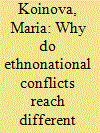| Srl | Item |
| 1 |
ID:
129847


|
|
|
|
|
| Publication |
2014.
|
| Summary/Abstract |
The upsurge of unrest in Northern Ireland in December 2012 was unexpected as it ran counter to the prevailing assumption that the settlement of the conflict embodied in the Good Friday Agreement of April 1998 had finally taken root. Prior to the Belfast City Council's decision to limit the flying of the Union flag to designated days, Northern Ireland's political dispensation seemed completely secure. Indeed, arrangements for Northern Ireland's governance were being widely touted as a model for the resolution of ethnonational conflicts. The crisis has given resonance to an older interpretation of the problem in terms of settlers and natives.
|
|
|
|
|
|
|
|
|
|
|
|
|
|
|
|
| 2 |
ID:
108677


|
|
|
|
|
| Publication |
2009.
|
| Summary/Abstract |
Why did ethnonational conflicts reach different degrees of violence during the 1990s: high in Kosovo, middle-ranged in Macedonia, and low in Bulgaria? This article analyzes the relationship between the Albanians of Macedonia and Kosovo, the Turks of Bulgaria, and their respective states. Challenging democratization and security dilemma theories, it argues that the relative changes in minority rights compared to the communist period, rather than the absolute scope of minority rights granted by the new constitutions, created a political threshold early in the transition period that propelled causal chains of minority-majority interactions that led to different degrees of ethnonational violence. Combined with the status change, governmental strategies of co-optation, or coercion prompted the minorities to pursue their demands either through the institutions of the state (Bulgaria), through clandestine activities (Kosovo), or through a combination of both (Macedonia). This article also argues that a timely governmental response to nonterritorial minority demands prevented them from expanding to become territorial and from triggering higher levels of violence.
|
|
|
|
|
|
|
|
|
|
|
|
|
|
|
|